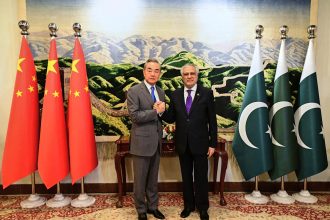The Chinese Ambassador to Nigeria, Yu Dunhai, has highlighted the growing popularity of Wushu in Nigeria, describing the sport as a vital medium for cultural exchange and mutual understanding between both nations.
Speaking at the finals of the Chinese Ambassador’s Cup Wushu Championship in Abuja on Friday evening, Dunhai said Wushu represents more than just physical training — it embodies values central to both Chinese and Nigerian cultures.
“Wushu is a precious treasure of Chinese culture. It not only builds our bodies but also shapes our character and spirit. It embodies core Chinese values — self-discipline, self-improvement, and a commitment to respecting and helping others.
“These resonate deeply with Nigerian culture, which also cherishes hard work and social harmony,” the envoy said.
He noted that Wushu has “taken root and flourished” in Nigeria, drawing practitioners from both cities and rural communities.
The ambassador also linked the sport’s growth to China’s Global Civilisation Initiative and ongoing China–Africa cooperation efforts.
“In 2023, President Xi Jinping put forward the ‘Global Civilisation Initiative,’ emphasising that civilisations become enriched through exchange and thrive through mutual learning.
“At the 2024 Beijing Summit of the Forum on China–Africa Cooperation, President Xi and President Tinubu held a successful meeting where they agreed to strengthen cultural and sports exchanges, designating 2026 as the ‘China–Africa Year of People-to-People Exchanges”, he said.
Dunhai further announced that Wushu will feature as an event at the 2026 Dakar Youth Olympic Games, calling it a milestone for Africa’s martial arts community.
“This is a significant moment for every Wushu enthusiast here today. It opens up new opportunities for the sport’s growth across Africa,” he added.
He encouraged Nigerian athletes to see Wushu as “more than just a sport,” but as a way to connect with Chinese culture and to serve as ambassadors of the China–Nigeria friendship.
“The Chinese Embassy in Nigeria will continue to support the development of Wushu in Nigeria. We will work with the National Sports Commission and the local Wushu community to create more platforms for exchange and learning,” the ambassador assured.
He added, “I look forward to the day when more Nigerian Wushu enthusiasts will visit China, see famous sites like the Shaolin Temple, and experience the depth and beauty of Chinese Wushu culture.”
The Chairman of the National Sports Commission, Shehu Dikko, commended the Chinese Embassy’s support, saying the sport holds immense potential among Nigerian youth.
“Wushu is gaining ground in Nigeria, and with continued support, it will create another path for our youths to achieve their dreams. Now that it’s reaching the Olympic level, we will take it even more seriously,” Dikko said.
At the championship, Justice Unanka won gold in the Taolu Single category, Naima Sanusi triumphed in Tai Chi, Goodluck Emmanuel took gold in the 75kg Male Sanda, and Winnifred Agara won the 60kg Female Sanda event.
Wushu, a modern sport derived from traditional Chinese martial arts, features Taolu (routines or forms), Tai Chi (a style focusing on balance and fluid motion), and Sanda (combat sparring involving punches, kicks, and throws).
The event, held at the National Stadium, drew a large crowd of spectators eager to watch the athletes showcase skill, discipline, and cultural pride.









